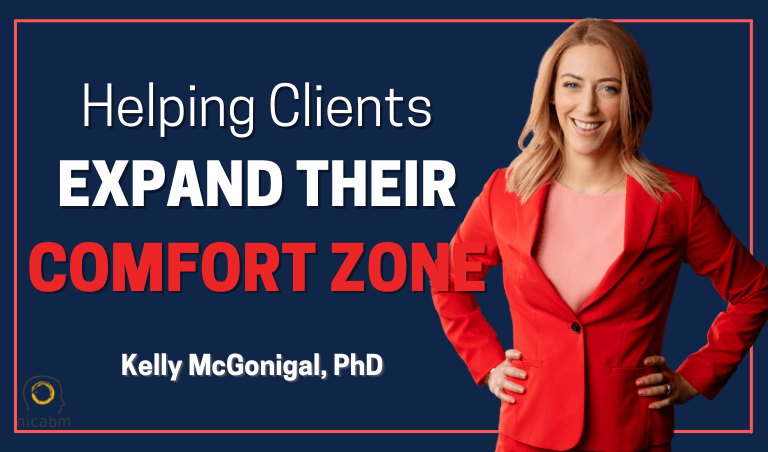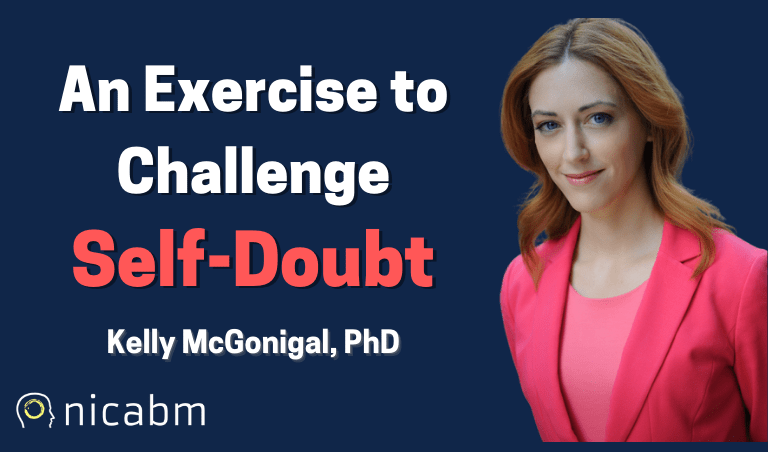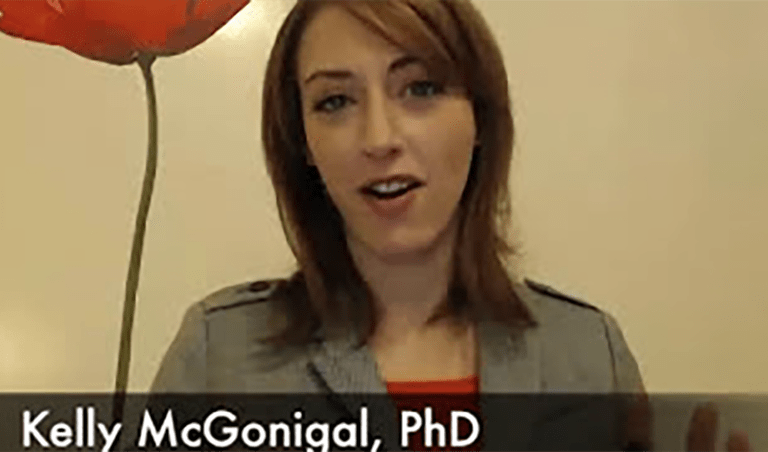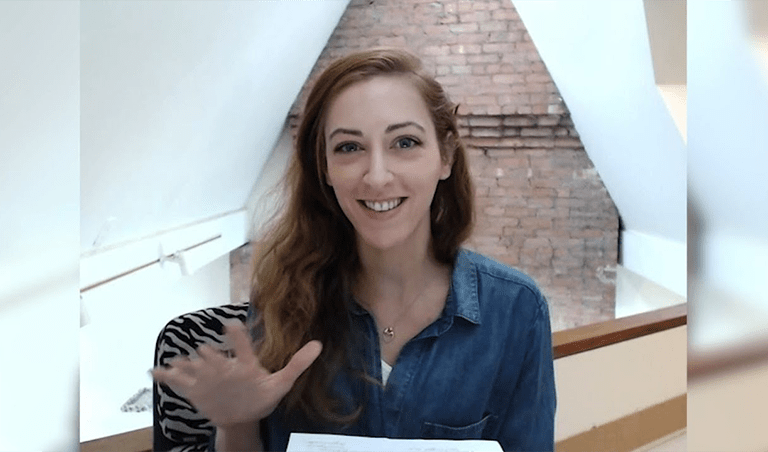NICABM Experts
Kelly McGonigal, PhD
Kelly McGonigal, PhD, is a health psychologist and lecturer at Stanford University. Much of her work focuses on positive psychology, the mind-body connection, self-compassion, mindfulness, and strategies for managing different kinds of stress. She is also an advocate for movement and exercise as a way to improve well-being.
Dr. McGonigal strives to distill neuroscientific and psychological insights into practical strategies that everyday people can use. She has dedicated much of her time to advising non-profits and other organizations on how to implement evidence-based strategies for increasing well-being in settings like the workplace and schools. She has also helped create the Stanford Compassion Cultivation Training program, which helps people work toward heightening their empathy and compassion.
Dr. McGonigal has authored several books, including The Upside of Stress: Why Stress Is Good for You and How to Get Good at It[1] and The Willpower Instinct: How Self-Control Works, Why It Matters, and What You Can Do to Get More of It.[2]

Here are some highlights from her work . . .
Using Mindfulness and Self-Compassion as Coping Strategies for Stress
Mindfulness and self-compassion can be effective coping strategies for stress, anxiety, and fear.
That’s because instead of avoiding these negative experiences, mindfulness pushes us to face these trials head-on.
Dr. McGonigal describes how you can use mindfulness practices to help a client begin to overcome their fear by using the following steps:
- Turn your client’s attention to what they lose when they give in to their fear, whether that be missed opportunities, loss of independence, or a lack of self-care.
- Motivate your client to use mindfulness strategies to help them choose the anxiety-provoking option. When faced with a choice to give in to fear or to face anxiety, the goal is to help clients choose the option that they will be most content with in the long run. So, while both these paths can lead a client to feeling trapped, Dr. McGonigal argues that this feeling is only temporary when a client chooses to face their fears.
- Show your client how they can manage the temporary anxiety using mindfulness. Mindfulness techniques, like bringing awareness to your surroundings, can help a client work through their immediate anxiety.
- Encourage your client to give themselves credit for being able to persevere through their discomfort. According to Dr. McGonigal, ending any mindfulness practice with appreciation is essential because it acknowledges a client’s courage and celebrates their accomplishment. You can help facilitate this appreciation by asking questions like, “How amazing is it that you were willing to be with this discomfort? How amazing is it that you made time for this practice today? Can you acknowledge your own courage?”
How to Make Stress Your Friend
For many people, the word “stress” has a negative connotation. After all, there’s so much talk about how it can be detrimental to our long-term physical health.
But Dr. McGonigal likes to emphasize that research[3] suggests the way we think about our stress can impact whether it positively or negatively impacts us – more so than the sheer amount of stress we experience.
Based on this finding, Dr. McGonigal encourages people to change the way they view their stress. So instead of seeing stress as a form of anxiety, we can view it as a sign that our bodies are becoming energized to help us to rise to the challenge we are facing.
That’s why Dr. McGonigal often says, “When you choose to view your stress response as helpful, you create the biology of courage.”
“One of the first ways you can change your relationship [with stress and anxiety] is to change your initial interpretation of what it means that you’re feeling anxious. Most people’s initial interpretation of anxiety is, ‘Something really is wrong,’ or, ‘Something really bad is going to happen,’ or, ‘There’s something really wrong with me – I don’t belong here.’ And one possible other interpretation is, ‘This anxiety is arising because I care about this, I care about this person, I care about this situation.’”
– Kelly McGonigal, PhD, Expert Strategies for Working with Anxiety
Dr. McGonigal also likes to highlight another upside to stress: It can make us social.
Part of that is due to the neurohormone oxytocin. Many people refer to oxytocin as the “love hormone,” because it’s released during bonding activities, like childbirth.
But oxytocin also plays an important role in the stress response. When stress activates the body’s nervous system, oxytocin tells us to seek out support. Not only that, but it also protects the cardiovascular system from some of the harmful effects of stress.
How to Help Clients Increase Willpower
Clients might struggle with finding the willpower to make positive changes in their lives. People often wonder if there is some kind of “quick-fix” to developing willpower.
While developing willpower isn’t something that happens overnight, Dr. McGonigal does emphasize one factor that can be key in helping clients cultivate their willpower.
“Of anything that you could do to change your brain, to train your brain, and also to reduce stress, so that you’re going to be better able to have willpower in other domains, exercise is definitely it.”
– Kelly McGonigal, PhD, Is There a Willpower Miracle Cure?
Exercise, she says, can be that “willpower miracle cure” for some people who struggle to stay motivated. Although many feel they need willpower to exercise in the first place, Dr. McGonigal frames exercise as being one of many sources that willpower can come from.
Not only can exercise provide a multitude of physical benefits, but it can also boost overall brain health and cognitive ability. Encouraging your client to adopt a regular exercise regime can be a powerful catalyst for developing willpower in other areas of their life.
Now when it comes to willpower, many people might think this skill is about curbing impulses.
But Dr. McGonigal likes to emphasize that having willpower goes beyond just fighting off cravings.
Overall, she describes willpower as, “the ability to do what matters most, even when it’s difficult.” And according to her, there are three core skills that go into having willpower:
- “I Won’t Power” – This has to do with our ability to resist temptations that might conflict with our goals or values.
- “I Will Power” – This is the ability to find motivation and energy to do the things we find boring, uncomfortable, or overwhelming.
- “I Want Power” – According to Dr. McGonigal, this is the most overlooked aspect of willpower. “I want power” means having a big-picture vision of your life, including your values and goals. This skill is what often motivates clients to find courage and perseverance, even when they feel stressed.
Helping clients develop these skills can be vital for them to make healthier decisions that are more in line with their long-term goals.
How to Help Clients Embrace Uncertainty
Feelings of uncertainty typically stem from a lack of control over certain situations. Naturally, a person might think that having a sense of control can alleviate this.
But Dr. McGonigal doesn’t see uncertainty as an issue that needs to be solved. Since there is very little that we can ever be certain about, she sees uncertainty as the “default” in life.
“I think it [uncertainty] becomes a problem when people are looking for not so much an experience of certainty, but a desire to control or a desire to avoid challenge to their own worldview or expectations.”
– Kelly McGonigal, PhD, Why Uncertainty Is Not a Problem to Be Solved
So instead of letting clients ruminate on what they can and can’t control, Dr. McGonigal suggests this three-step approach that practitioners can use to help clients who struggle with uncertainty:
- Affirm the part of the client’s identity that feels like it’s being threatened by uncertainty. Highlight the fact that the client cares deeply about whatever issue they are facing, even though they may feel out of control.
- Acknowledge the difficulties your client is facing. In response to feeling out of control, a client might avoid feeling the disappointment, shame, or anger that might come with their situation. That’s why it can be especially powerful to give them the permission to acknowledge and articulate the pain behind their uncertainty.
- Help shift the client’s focus from control to choice. Instead of asking clients what they are able to control, you might ask them questions like, “What can you choose in this situation?” or, “What can you bring to this situation?” Emphasizing choice over control, says Dr. McGonigal, can help a person struggling with uncertainty to bring a wise, compassionate perspective into view. And to cultivate that perspective, she says that it can help for people to remind themselves of this phrase: “I alone am not the cause of this suffering, and I alone cannot resolve or cure this suffering.”
Through a variety of self-compassion, mindfulness, and reframing techniques, Dr. McGonigal’s practices aim to initiate change in a client’s life through the power of positive psychology. Integrating these strategies into your clinical work can be instrumental in sparking more lasting change in your clients.
References
For More Information . . .
You can check out a course with Kelly McGonigal, PhD, here:

Working With Core Beliefs of “Never Good Enough
4 CE/CME Credits Available

Clinical Application of Compassion
14 CE/CME Credits Available

How to Work with a Client’s Emotional Triggers
4 CE/CME Credits Available

How to Work with the Patterns That Sustain Depression
3.75 CE/CME Credits Available
Find out more about Kelly McGonigal’s approach to working with positive psychology here:

Helping Clients Expand Their Comfort Zone
When it comes to treating anxiety…

An Exercise to Challenge Self-Doubt
When a client suffers from impostor syndrome…

Is There a Willpower Miracle Cure?
Is there such a thing as a “willpower miracle cure”?. . .

How to Help Clients Manage Uncertainty
When clients are feeling out of control. . .